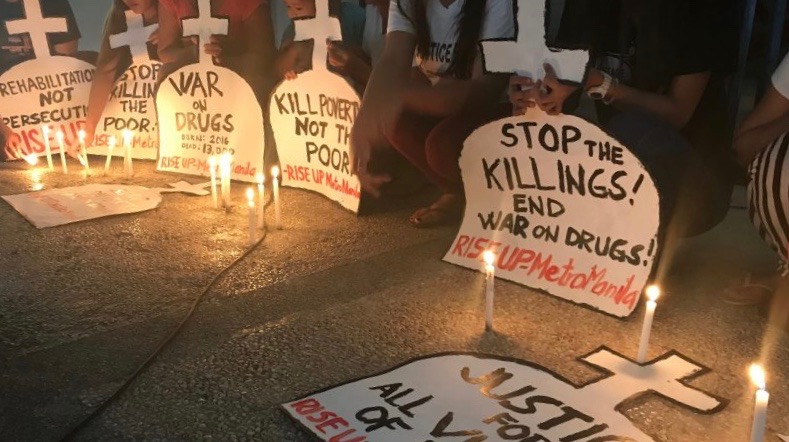Rights groups and families of victims of anti-drug operations in the Philippines have called on the Rodrigo Duterte government to end its bloody campaign against illegal drugs. The initial findings of an inter-departmental investigation by the Department of Justice (DOJ) presented in a high-level meeting of the United National Human Rights Council (UNHRC) on Wednesday, February 24, showed that the police violated protocols in events of deaths during anti-drug operations.
Justice secretary Menardo Guevarra, who presented findings, told the UNHRC that “In more than half of the records reviewed, the law enforcement agents involved failed to follow standard protocols pertaining to coordination with other agencies and the processing of the crime scene.”
The findings were based on over 5,000 case files from major provinces where anti-drug operations were undertaken, including parts of Metro Manila, Bulacan, Pampanga and Cavite. All the cases reviewed had the suspects being killed in official raids and anti-drug operations for resisting arrests. Such cases are often called nanlaban (resisting) cases by the local Filipino media.
This is the first time that a top government inquiry has found serious wrongdoings by enforcement officers of the Philippines National Police (PNP) since Duterte launched his war on drugs in 2016. Official raids and operations alone have led to 5,810 deaths as of September 2020, according to government figures.
The number may be much higher due to extra-judicial killings by law enforcement officers and military forces, along with vigilante anti-drug groups and right-wing militia. Independent estimates of the actual death toll by human rights activists and the media range between 12,000 to 20,000. The operations have also led to tens of thousands of arrests, for even the most minor non-violent charges.
Activists have nevertheless criticized the findings for failing to ask the right questions. “It appears that the inter-agency report wittingly or unwittingly diverts the primary and sole blame on lowly police operatives and insulated and saved the principal enablers of the extrajudicial killings,” said Edre Olalia, president of the National Union of Peoples’ Lawyers (NUPL). Olalia argued that the findings only “dodged the fundamental and more crucial questions” of why the killings happened in the first place. “It is too belittling and too belated. Stopping the bloody approach to the drug menace is an imperative,” he added.
Despite the shortcomings of the DOJ’s findings, rights advocates and families of the victims have only intensified the calls to end the war on drugs in the Philippines. Rise Up for Life and for Rights, an organization representing the victims of rights violation in the anti-drugs campaign and their kin, said in their statement that the findings “proved the point in the cases of families whose loved ones have been killed – that they were killed in cold blood and that there was cover-up by the police and authorities, while the President cheered them on.”
Karapatan secretary-general Cristina Palabay echoed the sentiments, pointing out that the findings “have only made the call to stop the killings and the policy on the drug war even more imperative.” In a statement, Karapatan said that activists “are still counting the bodies, we are still looking at numerous perpetrators in uniform unpunished, and we still hear the President and his henchmen justify the murder spree.”
“Such findings only prove that an independent probe is even more important, at a time that the human rights situation has gone into a steep descent to a full-blown crisis under an authoritarian regime,” added Palabay.
The findings are a result of months long inquiry by a DOJ review panel which was set up in June 2020 after much protests and condemnation against the killings and state violence from within and outside the country. Both the UNHRC and the International Criminal Court (ICC) have released reports strongly criticizing the government’s role in fanning the drugs war and the rampant extrajudicial killings in the region.
With inputs from Bulatlat and Rappler





